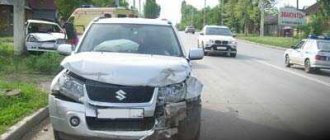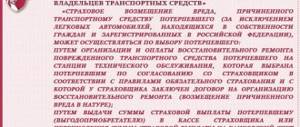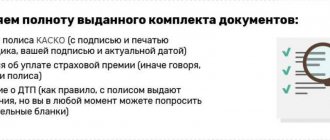Home / Complaints, courts, consumer rights / Services and consumer protection
Back
Published: 10/06/2018
Reading time: 6 min
0
654
Carrying out restoration repairs to a car after damage, if it is included in the insured events, is carried out under the CASCO insurance program.
- Procedure for a car owner in the event of an insured event
- What affects the duration of repair work?
- Maximum car repair time
- Repair times at official and unofficial dealers
- Procedure in case of violation of repair deadlines
In this case, the insurance company must adhere to the maximum deadlines for repair work established by law or contract. In case of violation, the insurer faces liability.
What the law says
If the Insurance Rules and the CASCO agreement do not specify the time for restoration work, the client can safely follow the following regulations:
- Civil Code of the Russian Federation
Article 314, paragraph 2 of the Civil Code states that if the deadline for repair work is not indicated anywhere, it must be completed within a reasonable time.
- Law on consumer protection
Establishes that the maximum period for completing work cannot exceed 45 days.
What does it depend on and who is responsible?
The timing of restoration repairs is regulated by the rules of operation of the insurance organization and is necessarily recorded in the insurance contract (Article 943 of the Civil Code of the Russian Federation).
Thus, according to the law, it is the insurance company with which the corresponding agreement has been concluded that is responsible for the timing of repairs under CASCO. The repair organization is obliged to strictly follow the established rules.
What factors does the parameter under consideration depend on, besides the current rules? Determination of deadlines is influenced by:
- the severity of the injuries received. To eliminate serious damage that requires a complete replacement of any components and assemblies, it takes more time than to carry out minor repairs. In addition, if the insured car was damaged by 75% or more, then the repair time may be delayed due to the insurance company, which will decide on the advisability of restoration work. In some situations, it is better to pay compensation for the “Total Loss” risk rather than restore the vehicle;
- individuality of damaged parts. Repair of a foreign car (especially high-end and luxury equipment) may take longer due to the lack of necessary parts in the organization, and delivery of units requires additional time;
- agreement between insurance and repair organizations. In most cases, companies work on the basis of an agreement, in which a separate clause stipulates the timing of repairs in the direction. If vehicles are sent to an organization with which there is no such agreement, then the deadlines may be delayed due to the fault of the repair organization;
- presence/absence of a queue for repairs. In large insurance companies with many obligations, the time frame for vehicle restoration may be delayed due to the large number of insured events. Quite often such situations arise, for example, after the first snow falls and ice forms.
Required documents
In order to receive compensation (monetary or in the form of car repairs) without delay, the car owner must strictly follow the basic provisions of the insurance contract upon the occurrence of an insured event. Each comprehensive insurance contract contains records regulating the procedure and deadlines for notifying the insurance company of the occurrence of an insured event. Typically, you need to submit an application to the insurance organization with the following documents:
- Car owner's passport;
- Original insurance contract and comprehensive insurance policy;
- Driver's license of the person driving the insured vehicle;
- Technical passport of the vehicle involved in the incident;
- Form 31 certificate from the traffic police describing the nature of the damage to the car;
- Protocol from the scene of the accident with records of the accident;
- Expert opinion on car assessment;
- A certificate of completed maintenance work at a service station for payment, in a situation where emergency repairs were carried out by the car owner independently.
After this, a representative of the insurance company must issue a referral for repair work to one of the company’s partners, where the damaged car will be thoroughly inspected. Based on the results of the inspection, an official defect report is drawn up, which describes in detail all the problems that need to be corrected. The result of a visit to a car service center is the formation of a conclusion about the condition of the car, the possibility and timing of its repair, and the exact start date of the service. Only on the basis of this conclusion can the company establish specific terms and conditions for repair work.
When a referral is issued
The timing of issuing a referral for repair of a damaged vehicle is regulated by the insurance contract concluded with the companies.
In standard situations, to receive a referral for car repairs, you must:
- submit a written application to the auto insurer regarding the insured event;
- collect and submit to the company a set of documents that determine all the most important factors of the insured event;
- undergo an examination to determine damage.
The period established by the contract will be calculated from the moment of carrying out all the listed operations. On average, it takes a car insurer no more than 30 days to fulfill its obligations.
However, it should be noted that the calculation of this period will begin:
- from the moment of submitting documents, if the car is damaged as a result of any circumstances;
- from the moment of receiving a certificate of refusal/closure of a criminal case, if the vehicle was stolen.
The CASCO insurance contract may establish a list of insured events for which documents are not required, for example, repair of a windshield under CASCO. In this situation, the time frame for providing referrals for repairs may be reduced.
This is also important to know:
How to return goods to an online store: everything you need to know
Thus, in order to independently monitor compliance with the deadlines for repairs of the insured car, you must carefully read the concluded auto insurance contract.
The court's position based on individual cases presented in the 2017 Review
Every year, thousands of cases involving lawsuits between parties to an insurance claim are reviewed. The Supreme Court regularly provides clarifications regarding the interpretation of the law in relation to the policyholder and the company that issued the policy.
At the end of 2021, in the latest Review of the Supreme Court of the Russian Federation on voluntary motor insurance, descriptions of the situations considered in court were given and definitions of the recommended position of the court were given, based on current practice.
The latest review contains the following rules established in the process of initial lawsuits and re-examinations of cases in higher authorities:
- The contract value of the insured property cannot be disputed unless the company has conducted an independent risk assessment and has been misrepresented by the client as to the actual value.
- Signatories of the contract have the right to independently determine situations that can be classified as insured events and their exceptions, if there are no rules preventing this from the law.
- It is possible to exclude from the contract the provisions on the mandatory consideration of technical equipment when calculating compensation.
- If a controversial situation arises and doubts arise about the correct interpretation of the rules of the insurance contract, the circumstances should be interpreted from the position most favorable to the policyholder.
- A situation that occurred during the validity of the contract is subject to insurance compensation, even if the application from the car owner was received after the completion of insurance coverage.
- Justifying the refusal to pay by the fact that the citizen did not appeal the decision to refuse to proceed with the application submitted to law enforcement agencies is considered unlawful and does not relieve one from obligations under the contract.
- A change in the full amount of the insurance payment is possible if the agreement signed by the parties establishes the possibility of adjusting the amount of compensation and taking this possibility into account when determining the cost of the CASCO policy. Upon full payment, the policyholder transfers the right to the vehicle in favor of the auto insurer and accepts the payment determined at the time of the insured event.
- If the company cannot organize proper repairs with restoration work that takes into account the specifics of the vehicle at a service station cooperating with the insurance company, the CASCO policy holder has the right to recover an amount that will cover the costs of quality repairs. But no more than the amount defined as the full insurance payment.
- In a situation where, during the restoration process, amounts that were overpaid and not required were discovered, they must be returned to the insurance company. Otherwise, the situation is considered as unjust enrichment.
- For voluntary insurance, cases of cessional transfer of the rights of claim of the beneficiary by re-registering them to another citizen are applicable. This becomes possible after the policyholder takes the measures established by clause 2 of Art. 956 Civil Code.
- The responsibility of the policyholder is to provide sufficient evidence confirming the existence of a CASCO agreement and the occurrence of circumstances defined as an insured event. The defendant company must provide evidence of the existence of a right that exempts it from fulfilling the terms of the contract related to compensation. For example, it is reasonable to point to another source of the insured’s losses.
- If a consumer rights claim is made, the plaintiff must prove that the covered vehicle was not used for commercial purposes.
- The fact that money was transferred to the policyholder in the required amount is not a reason for refusing to satisfy the claim in respect of the amount in question. However, it can be used to offset financial obligations incurred when executing a court decision.
- After a partial transfer from the insurance company and clarification by the beneficiary of the requirements of the claim, this fact is not a justified reason for exemption from payment of the fine amounts calculated in the application, which were originally stated when applying to the court.
- If the company voluntarily made part of the payment, this fact serves as a basis for considering the insured event proven, suggesting further additional payment for compensation. If the claims are satisfied, the defendant is not exempt from collecting penalties and compensation for moral damages.
- The requirement to pay a penalty arises on the basis of Art. 28 Federal Law No. 2300-1. In connection with the refusal of the insurance company to make an insurance payment, the amount of the penalty is calculated in proportion to the amount of the insurance premium.
- The maximum amount of payment collected for late execution of the contract is determined by Art. 5 Federal Law No. 2300-1, i.e., based on general consumer protection standards, no more than the amount paid as an insurance premium.
- It is possible to oblige the defendant to pay a fine not only through the personal presence of the beneficiary at the trial, but also through a person legally representing his interests in court.
- If the repairs are performed poorly, under general law this is regarded as dishonest fulfillment of the terms of the concluded contract by one of the parties. Within the framework of paragraph 1 of Art. 29 of the Federal Law on Consumer Rights, when indemnifying insurance in kind, the client has the right to insist on payment corresponding to the costs of eliminating identified deficiencies.
- The rights of the insured's heirs are preserved in relation to voluntary motor insurance, with the application of consumer protection standards, if the purpose of the insurer's services does not have a commercial basis and is not aimed at generating income from business.
What documents are needed
To receive a referral for repairs, you must provide a number of documents to the insurance company, which depends on the type of insured event.
In any situation you will need:
- a valid CASCO policy and a receipt for payment of the cost of the insurance policy;
- civil passport of the car owner;
- registration documents for the vehicle (PTS, STS);
- driver's license of the person driving the car at the time of the accident;
- diagnostic card confirming the serviceability of the insured vehicle.
If the damage is caused by a road accident, then additionally the following is provided:
- Certificate of participation in a road accident. The documents establish the fact of the accident, the parties involved and the damage received.
- Information about the incident. The document reflects data about the drivers and vehicles involved in the accident. The documents drawn up and the damage received are also indicated.
- Copies of the protocol and resolution on the administrative offense committed (provided if such documents were drawn up). These documents can be replaced by a notification of an accident (European protocol).
- Copies of documents confirming the refusal to initiate an administrative case (the document is provided if a protocol was not drawn up at the scene of the road accident).
If the damage to the car was caused by illegal actions of third parties (repair under CASCO without an accident), then the car insurer is provided with:
- Notification from the Department of Internal Affairs about the occurrence of an insurance situation.
- A certificate from the Department of Internal Affairs confirming the circumstances of the occurrence of the insured event and the presence of damage.
- Documents confirming the initiation or refusal to initiate a criminal case.
If the damage was received under other circumstances, then the following is provided:
- certificate from the Hydrometeorological Service (natural disaster);
- a certificate from the fire inspectorate and a fire report (fire);
- certificates from the relevant authorities (man-made accidents, pipeline accidents, etc.).
If the insurance contract provides for the possibility of repairs under CASCO without certificates, then in order to receive a referral for restoration repairs, only a standard set of documents is provided.
The following situations are not subject to payment
- Non-physical damage (moral damage), possible benefit, lost working time and other losses, including commercial risks of the insured that occurred as a result of the insured event.
- Damage to any property located in the vehicle at the time of the incident.
- Damage due to natural causes (corrosion, downtime) during operational use of the equipment, if this equipment is not included in the package by the manufacturer or is not separately insured.
- Damage to all additional equipment, tools, rescue equipment in an emergency, decorative trim of the body and interior, if it was not installed by the manufacturer or was not insured separately.
- Damage due to theft or damage to the on-board car radio, if the front panel is left removable in this vehicle while the driver is away.
- In case of loss or theft of state registration marks.
- Damage to wheels and disc accessories without damaging the technical components of the vehicle.
- Damage with minor damage to the body enamel, without deformation or damage to the body part itself.
- Damage from chips of body glazing, light sources, direction indicators, cracks resulting from a sharp temperature change on the glazing, vehicle lighting, without obvious signs of mechanical damage, if these sources of risk were not previously determined when concluding an insurance contract.
- Loss of ignition keys, key fobs, digital control electronics and activation elements such as cards and chips by any means.
- Any equipment and spare parts of the vehicle, as well as parts located outside the vehicle at the time of the insured event.
- Theft of a spare tire or spare tire casing that occurred without causing damage to the vehicle itself.
- Harm of any degree caused to the vehicle or victims when the vehicle is used by third parties who do not have the right to do so.
- Damage to property caused by the theft of individual mechanical units, parts and other equipment, in case of violation of the legal sphere by third parties, if this vehicle did not have the “Theft” risk in the insurance contract.
Repair period according to comprehensive insurance
Since comprehensive insurance is voluntary insurance, the repair period under comprehensive insurance is not defined by law. The provisions of the Civil Code of the Russian Federation and the Law on Insurance indicate that the conditions for compensation for damage, including the timing of repairs under comprehensive insurance, must be determined by the insurance contract or insurance rules. There is a Regulation on the maintenance and repair of vehicles, approved in 1992 by Order of the Ministry of Industry. The data in this document can be used by car owners who have received a referral for repair work at the insurer’s service station, unless other terms are specified in the comprehensive insurance contract.
Maximum term
The regulations of the Ministry of Industry provide comments on the timing of repair work for domestically produced vehicles, indicating the maximum allowable time for restoration, which depends on the type of damage. Thus, engine repair should not exceed 2 days, body paint, taking into account the removal of old paintwork - no more than 15 days, actions related to tinsmithing and welding work - no more than 20 days. The longest period - 50 days - is given for complex tinsmithing and welding work with complete painting of the car.
Article 20 of the Consumer Rights Law states that the maximum period for troubleshooting should not exceed 45 days. If an additional agreement was concluded between the parties to the contract regarding the timing of car repair work, but the process is delayed due to the lack of necessary parts or other reasons, then this cannot serve as a basis for revising the originally established deadline and releasing the company from liability to its client .
From an official dealer
Repairs under comprehensive insurance from an official dealer usually do not exceed 30 days and, depending on the complexity of the damage received in an accident or other situation, can be reduced to 1-14 days. The client has the right to receive reports from the car service about the progress of work and the time spent on restoring certain parts.
This is also important to know:
How to return money to the buyer
If, after completing all restoration work, the car owner finds unrepaired defects, the service station, in accordance with paragraph 2 of Article 314 of the Civil Code of the Russian Federation, is obliged to eliminate them within the next 7 days.
Free legal consultation
We will answer your question in 5 minutes!
Free legal consultation We will answer your question in 5 minutes!
Ask a Question
Ask a Question
From an unofficial dealer
Under the terms of some insurance contracts, repairs under comprehensive insurance may be carried out by unofficial dealers. Sometimes an organization issues a referral to an unofficial dealer, circumventing the terms of the contract. This decision may be motivated by the fact that the official dealer uses only original spare parts for repair work; sometimes they are not available and you have to waste time waiting for their delivery.
For the most part, informal situations do not arise. During their work, they can also use non-original parts, which will be economically beneficial for the insurer, because the cost of such parts is lower. Often in such situations, work is delayed, since such service stations do not have the proper technical equipment and highly qualified specialists. Despite this, the period cannot be longer than 45 days established by the consumer rights law.
If it's your fault
If the comprehensive insurance policy and insurance rules provide for the risk of damage to the car due to the fault of the car owner and repair work of damaged property in a car service can be used as compensation, then the work is carried out within the same time frame - no more than 45 days. If an accident due to the fault of the car owner is not an insured event under the contract, then he will be denied insurance payment and a referral to a service station, because the insurer will have no reason to fulfill his obligations.
Reasons for refusal to pay under CASCO
The grounds under which the insurance company has the right to refuse to provide payment are listed in the concluded contract.
There can be quite a few such situations:
- gross violation of traffic rules resulting in harm. Serious violations include: speeding by more than 60 km/h, driving while intoxicated, driving in the oncoming lane. On the same basis, the insurer may refuse if the driver does not pass the technical inspection within the prescribed time. In any case, it is necessary to prove that the accident occurred precisely as a result of the driver performing certain actions, otherwise the insurer is obliged to pay compensation;
- violation of the procedure after an accident. Often the policyholder deprives himself of the opportunity to receive compensation. You cannot write a receipt or a statement stating that there are no claims against the culprit, since in this case the insurer will not be able to make claims against him, and the insured will lose payment;
- violation of the rules for registration of road accidents. In order to avoid problems with the insurance company, it is necessary to call the traffic police immediately after the accident. Only on the basis of a correctly documented accident can you receive payment. It is also important to monitor the information provided, it must correspond to reality;
- self-repair of the vehicle. If work has begun to independently restore the car, the insurance expert will not be able to accurately determine the amount of damage caused, which will result in a refusal.
The above cases are general and apply to any insurance contract.
In addition, each insurer may offer other ambiguous conditions that may cause problems with obtaining compensation:
- Damage to a vehicle as a result of a fire in another nearby vehicle;
- damage to the vehicle due to falling objects or cargo from another vehicle;
- other violations of established rules by the owner.
To know about all the grounds in each specific case, you should study the signed agreement in as much detail as possible.
Where to make repairs
If it is not intended to pay compensation in money, but a referral for repairs is issued, then, as a rule, it is carried out at a station with which the insurance company has an agreement. At the same time, the policyholder in the application for compensation for the loss can indicate the institution where he intends to carry out restoration. Also, this point is stipulated at the stage of concluding the contract, which the car owner must provide for, and the representative of the insurance company must clarify. There is also the option of restoration at a service center that services the car under warranty.
By franchise
When using a franchise in a contract, the driver must understand that he will have to pay some amount himself. If the other driver is at fault in the accident, you can receive compensation under the deductible from his company. Payment under CASCO and OSAGO from different companies for the same case is illegal.
Warranty car
A car that is under warranty, which is a new car, in accordance with the Resolution of the Presidium of the Supreme Court on the review of cases related to voluntary insurance, must be repaired by an official dealer.
The reason for this is the fact that if this requirement is not met, the warranty will be canceled and during subsequent repairs the owner will be forced to restore the car at his own expense. Important! If there is no service station within reach, the victim can demand compensation to restore the car at a price corresponding to the cost of the work at the dealer.
Cases when you cannot receive payment
The insurance company refuses to pay if:
- The case is not insured. The situation in which the vehicle was damaged may not be included in the list of risks.
- The car is used for taxi work. Such points are specified in the contract. This also applies to racing.
- The accident occurred while an uninsured person was driving.
- There were violations when recording the insured event. Such mistakes include refusing to call traffic police inspectors.
- The policy period has ended. Payment will be denied if the vehicle was damaged while the insurance was still in force, but the client submitted an application for compensation late.
- The insured event occurred abroad. The validity of the policy when traveling outside Russia is suspended. If it is necessary to use the policy abroad, an additional fee will be paid.
- The car was registered to another person. Payment is not assigned unless appropriate changes are made to the policy.
Order and nuances
In order to receive a referral to repair a damaged car in a timely manner, and not receive a refusal of insurance payment, you must:
- notify the car insurer of the occurrence of an insured event as soon as possible. Additionally, it is recommended to clarify the list of documents required for registration;
- do not miss deadlines for submitting applications and documents to the insurance company. Missing deadlines is often the reason for refusal to pay insurance compensation. The period allotted for submitting documents is also regulated by the CASCO car insurance contract;
- provide vehicles for the examination. Without the result of the inspection, it is not possible to receive a referral for repairs;
- if the insurance contract provides for a deductible, then compare the cost of repairs and the amount of the established non-payable amount.
- Repairs under CASCO franchise are paid only if a large sum of money is required to restore the vehicle;
- provide vehicles for repairs to the appropriate organization.
This is also important to know:
Resolution No. 55: list of goods that cannot be returned or exchanged when the list is not valid
Within 2 weeks, service stations are required to determine the cost of repairs and agree on the list of work with the insurance company. The policyholder must be notified of the commencement of work.
After the restoration of the vehicle is completed, an act is drawn up that regulates the transfer of the repaired vehicle to the owner.
If the repair is carried out efficiently and the car owner has no complaints about the car service, then the report is signed by both parties. Otherwise, you do not need to sign the document.
A claim regarding the quality of repairs is sent to the insurance organization, which is obliged to eliminate all identified deficiencies. If the auto insurer refuses, you can defend your rights in court.
Calculation of damages
The amount of compensation for damage caused is calculated taking into account the actual condition of the vehicle and its wear and tear.
The insurer determines the amount of payments based on the relevant documents, which confirm the actual amount of damage with a reduction by the corresponding amount of the deductible, including taking into account the wear and tear of the vehicle and installed equipment, in the event that the policyholder has chosen the calculation procedure specifically for the wear and tear of the vehicle with installed equipment ( if there is one).
Violation of deadlines and penalties
If repair work is delayed and the insurance company does not explain the reasons for the delay, then the policyholder has the right:
- pick up and repair a car at another organization;
- file a claim in court for reimbursement of expenses incurred for repairs.
With the amount spent on repairs, the owner of the car has the right to recover a penalty from the insurance company for delaying the fulfillment of obligations.
The amount of penalties, as a rule, is established by the insurance contract based on a certain percentage for each delay in delay.
However, before implementing the described scheme, it is necessary to follow the pre-trial procedure for resolving the dispute. The pre-trial procedure involves filing a written complaint with the head of the insurance company.
The document must indicate all aspects of the current situation. All documents about the occurrence of the insured event and the actions taken are also attached to the claim.
Most disagreements with insurance organizations are resolved during pre-trial proceedings.
Terms of treatment for poor-quality repairs
Quite often, the main problem when settling a loss under CASCO can be poor quality repairs of the car. In addition to the fact that a poorly repaired car loses its value, driving such a vehicle is sometimes simply dangerous for the lives of the driver, road users and pedestrians.
The injured party submits claims in writing to the service center, and in case of refusal, to the insurance company. If the organization refuses to carry out repeated repairs, the policy owner has every right to go to court.
If deficiencies or poor-quality repair work is detected by the service center, it is important to have an opinion from independent experts about this. It will be undoubted evidence of this fact if the injured party goes to court.
As compensation, according to a court decision, the policyholder is entitled to:
- payment of expenses for eliminating the consequences of poorly performed repair work;
- carrying out work to eliminate the consequences of poor-quality repair work;
- payment for the services of third parties or organizations - lawyers, independent experts;
- in some cases moral compensation.
A claim for low-quality repair work under CASCO can be filed within two years after it was carried out. If the shortcomings are more significant, the period for filing a claim increases to ten years.
Delivery time for spare parts
The most significant reason for repair delays is the lack of replacement parts.
On average, spare parts are delivered:
| Within 7 – 14 days | if the required units are ordered from companies located in the Russian Federation |
| Within 15 – 30 days | if the necessary spare parts are delivered from another country |
However, delivery situations may vary. For example, this unit is out of stock and an additional order of the item is required from the official manufacturer of the vehicle, or problems have arisen with the transport company from which delivery was ordered.
If a delay in repair work occurs due to the lack of spare units, the repair organization is obliged to notify the insurance company and the policyholder in writing of the reason.
The policyholder, by prior agreement with the auto insurer, has the right:
- replace the repair company;
- replace the method of receiving compensation with monetary compensation.
So, the deadlines for repairing motor vehicles under CASCO are regulated by law (maximum period) and the rules of work of the auto insurer.
To avoid delays in repairs, the policyholder must clearly state the deadlines for completing the work in the insurance contract and independently control the repair process.
Penalty for violation
The amount and procedure for paying a penalty for overdue insurance compensation or car repairs under comprehensive insurance at a service station are determined by the terms of the insurance contract. Most often, the penalty is equal to 1% or a fraction of a percent of the amount of restoration repairs (amount of insurance payment) for each day of missed time. You must first demand payment in a pre-trial manner by sending a claim to the insurance company. If the insurer refuses to voluntarily comply with the car owner’s demands, a claim must be filed in court.
An example of a court decision to collect a penalty
The plaintiff filed a statement of claim with the court demanding to recover from the insurance company insurance compensation in the amount of 37,944 rubles, technical insurance in the amount of 8,000 rubles, appraiser services in the amount of 8,000 rubles, as well as a penalty in the amount of 22,993 rubles.
In support of his claims, the plaintiff stated the following: on July 15, 2021, the car insured under comprehensive insurance was damaged. At the specified time after the occurrence of the insured event, he contacted the insurance company with a package of documents and an application for payment of insurance for damage to the car. In August 2021, the policyholder received a referral for repairs to a service station, but until November 2021, the repair work was not completed. A pre-trial claim was sent to the insurance company in writing, but it was not satisfied and the insurer did not provide any comments. At the court hearing, it was explained that in September 2016, the insurance client, after a month of waiting for repairs, sent a request to the service station to postpone the repair work until November 2021, so that during this time an independent examination of the damage to the car could be carried out.
The defendant in his objections stated that, according to the rules of comprehensive insurance, compensation for damage refers only to the repair of the car, nothing is said in the document about the payment of funds, therefore he refused to fulfill the requirements of the pre-trial claim of the insured. The plaintiff considers the claims to be illegal.
The court found that in 2015, a comprehensive insurance agreement was concluded between the parties, the policyholder fulfilled the obligation to pay the insurance premium in full and received a comprehensive insurance policy. In July 2021, an insured event occurred in relation to the plaintiff’s car, all documents and an application to the insurance company were sent on time. The insurer inspected the vehicle, opened a claim case and issued a referral to a service station to repair one item from the list of damages. In August, the car service sent a statement of disagreement to the insurer, since the calculation of the loss showed that the paid amount of money was 1,275 rubles less. The rules for repairs under comprehensive insurance assume that disputes must be resolved within 7 days from the date of notification. This was not done by the insurance company; therefore, the repair was not completed. Despite the objections, the insurer was unable to provide documents confirming payment of the amount in dispute. Due to questions about the cost and timing of repairs, the plaintiff turned to an independent expert to assess the damage to the car. The plaintiff attached the resulting calculation of the cost of repairs to a written claim for insurance payment, but was refused. The court considered the result of the independent examination to be correct and did not send the car for forensic examination.
The court, based on paragraph 42 of the Supreme Court Resolution No. 20, Article 3 of the Law No. 4015-1 on the insurance business, Article 13 of the Law on the Protection of Consumer Rights, decided to partially satisfy the plaintiff’s demands, collect insurance and payment for additional services in full, and reduced the amount of the penalty up to 10,000 rubles.
The law on the protection of consumer rights (clause 5 of Article 28) states that in case of failure to complete the work within the stated time frame, as well as refusal of it, the client may demand payment of a penalty in the amount of 3% of the cost of the work (in this case, the cost of restoring the vehicle) for each day of delay. If, after calculation, it turns out that the amount of the penalty exceeded 100% of the cost of the work, then the insurer will have to pay only 100% of the cost, no more. Article 333 of the Civil Code of the Russian Federation indicates that the court may reduce the amount of payment if it considers it incommensurate with the consequences of violation of the obligation.
Additional questions
What to do if the recovery period is really prolonged
If the insurer is in no hurry to respond to the submitted application, the person submitting it can safely write a complaint, guided by the above regulations.
The first stage of conflict resolution may be pre-trial proceedings. The policyholder contacts the insurance organization with a written complaint. It must indicate when the application was submitted. Relevant documents must be attached to it.
As a rule, the insurer resolves the issue and pays the victim a penalty specified in advance in the CASCO policy. If the company refuses to resolve the conflict, the policyholder must pick up the vehicle and file a lawsuit against the insurer or repair organization.
Article 430 of the Civil Code of the Russian Federation states that liability under an agreement concluded in favor of third parties accrues to both the creditor and the debtor. That is, if a service station believes that it does not bear any responsibility to the policyholder, then this is not true. The policyholder has the right to control the elimination of breakdowns and find out the reasons for the delay in repairs.
As compensation, according to a court decision, the policyholder is entitled to:
- payment for repair services (if the policyholder carried out repairs at his own expense);
- payment of penalties;
- in some cases - moral compensation.
How to protect yourself from possible problems with deadlines
Some conflicts with lengthy car repairs can be avoided if:
- immediately after the occurrence of an insured event, write a statement about this to the insurance company. This will help avoid claims. The deadline for filing is established by the Insurance Rules (maximum period - 3-5 days);
- try to indicate exact deadlines in order to be able to refer to them (if they are not specified in the Insurance Rules);
- Constantly monitor the situation, and in case of violations, contact the Investigative Committee or Service Station.
How to accept a car after repair
In order for the car to be accepted correctly, you should take care in advance about its correct delivery. To do this, the car owner must be present when the car is put into operation. The vehicle inspection must also be carried out in his presence and in good lighting conditions. Attention should also be paid to small scratches and dents.
This is also important to know:
Reasons for citizens’ appeal to the prosecutor’s office and the period for consideration of the application
A document that is confirmation of successfully completed work or fulfillment of obligations on the part of the insurance company is called an acceptance certificate. Its signing by the owner of the car means that there are no claims and that the work was done efficiently. Acceptance is made within 1 – 3 days.
The act itself should contain the following information:
- List of damages ordered to be repaired by the Investigative Committee
- List of parts that needed to be replaced
- Defects that were not part of the service station’s task to eliminate
- Hidden defects
- Description of the complete set
- Notes with comments from the car owner or wishes for services performed
The owner receives other documents:
- act on actually performed actions
- original work order
- a receipt confirming payment for work by the owner of the vehicle
- payment slip from SK
- invoices confirming payment for workshop parts
- warranty from auto repair shop
It is important to understand that you should sign any papers only after you have the desired result for the services provided. If work is identified that was done without the consent of the owner, he has the right to file a complaint with the service station and demand compensation. You can also go to court with it.
Poor quality repairs - what to do
Poor quality of repairs or incomplete implementation reduces the value of a car that has already suffered damage. This often happens during straightening, painting, or installation of new structural parts.
In such a situation, you can do the following:
- contact the workshop with a request to redo the work
- in case of refusal, contact the Investigative Committee
- go to court, RSA, Central Bank, Society for the Protection of Consumer Rights
Important
Requests, claims, and complaints are made in writing and sent in person or by registered mail. You must leave one option to confirm your request. It is signed by a representative of the organization. Going to court is relevant if low-quality parts were used, and as a result the car slows down, moves poorly, has scratches on the body, or poorly done work on the interior.
How to get money instead of repairs
Determining which is better: money or repairs is easier in case of an insured event and depending on the characteristics of the damage received. If the damage is insignificant, then it is better to choose money. To receive them, your requirements must be indicated in the application for compensation. According to the terms of some agreements, payment of money may not be provided. In this case, you can write about your claim, but whether it is approved or not will depend on the decision of the insurer.
Free legal consultation
We will answer your question in 5 minutes!
Free legal consultation We will answer your question in 5 minutes!
Call: 8 800 511-39-66
Ask a Question
Some companies offer more favorable offers on policies, providing the opportunity to have repairs done at a service station with which they have an agreement. The ideal solution would be to provide an alternative where the client has a choice in determining the choice between repairs and money for them.
There is a document on this issue - Resolution of the Plenum of the Supreme Court of the Russian Federation No. 20 dated June 27, 2013. according to which the victim, under such circumstances, can entrust the repair of the car to other people (third parties) or to do it himself, and then claim the required amount within the limits of insurance coverage for the restoration of the car.
Repair will be advisable in the following situations:
- The car is under warranty and will be restored in the center from an official dealer.
- The contract states payment of money taking into account wear and tear.
This is also important to know:
What is the quality of a product and how to determine it
Money is preferable in the following cases:
- The car is running, the damage is not significant.
- There are misunderstandings, conflicts, unpaid bills between the insurance company and the service station, and there is no agreement on the list of necessary works.
Thus, the repair of a vehicle under CASCO depends on the specifics of the case and the Rules, the organization of the activities of a particular insurance company. The owner should learn about how payment or restoration of the car can be made at the stage of drawing up the contract. The reason is possible situations that do not imply the presence of choice. When trusting an insurance company, one should not forget about vigilance, since how quickly, correctly, and efficiently the insurer’s obligations will be fulfilled depends on the condition and market value of the vehicle.
What to do if refused
If a refusal is received, such a decision must be handed over in writing. The next step is to contact an expert organization. She must be certified. Based on the refusal and expert opinion, you can go to court. He can help you get compensation or payment for repairs, money for a lawyer, or moral damages.
Why can they refuse?
There may be a refusal to apply for restoration. The most common reasons for this are the following:
- The insurer did not transfer money for repairs or did not transfer the entire amount.
- The service station received a vehicle that did not comply with its documentation.
- The CASCO agreement is expired.
- There are no necessary spare parts or technicians.
- The scope of work has not been agreed upon between the service station and the insurer.
- Intentional actions of the owner in relation to damage to the car.
- The driver is not included in the policy.
- The insured event corresponds to the list of exceptions according to the Rules of the Insurance Company (the driver was not sober, the car was faulty, which led to an accident).
If they require additional payment
A very common situation is when, upon arriving at a car service center, you are told that the insurance money transferred is not enough to completely restore the car, and they ask:
- or pay extra from your own pocket,
- either they will supply you with used spare parts or leave some elements unrepaired.
This is illegal in 2021! According to the MTPL law, the insurance company is obliged to fully compensate for the damage without any additional payments. Unlike payment in money, when damage is calculated taking into account the wear and tear of the car, when issuing a referral for repairs, wear and tear is not taken into account.
The lack of transferred money is not your problem. But it’s not a car service problem either. This is the insurance company's problem. In this case, provide the car to the service station under video recording, record the refusal to accept the car, specifying the grounds for refusal. Next, contact your insurance company and notify them about this.
When you tried to provide the car, you formally began a period of 30 days for repairs. Because the Federal Law on Compulsory Motor Liability Insurance clearly states the beginning of this period:
... the period for carrying out restorative repairs of the damaged vehicle (but not more than 30 working days from the date the victim presented such a vehicle to a service station or transferred such a vehicle to the insurer to organize its transportation to the place of restorative repairs);
If you are asked to sign an additional agreement
You don't need to sign anything. An additional agreement will most likely imply unfavorable conditions for you - the same replacement of new parts with used ones, additional payments, etc.
Remember that the legislation of 2021 does not require any documents from you when handing over your car to a service station under compulsory motor liability insurance.
Unconditional franchise 50%:
If the following cases occur that lead to actual damage, loss, disablement, or death of a vehicle with valid insurance. Franchise payments (unconditional) are made in the amount equivalent to 50% of the amount of the insurance contract.
- Taking possession of a vehicle by a person who has no reason to drive this vehicle or a vehicle in general. Also for persons under the pharmacological influence of medicinal substances prohibited when driving a vehicle, as well as in case of refusal to undergo a medical examination procedure.
- When carrying out unloading and loading operations involving a vehicle, any transportation of a vehicle as cargo, as well as participation in testing events and driving training without agreeing on these actions in writing with the insurer!
- In the event of a violation, either by the policyholder himself or by another person legally entitled to drive the insured vehicle, of any possible rules that must be observed when driving and maintaining the vehicle, such as fire safety, storage and transportation of hazardous substances or other similar items, requirements for transportation and transportation listed in the traffic rules.
- Spontaneous start of movement of a vehicle in a parking lot or parking lot (except for the risks “Accident”, “Civil liability of vehicle owners”).
- Unauthorized leaving of the scene of an accident by the driver, which led to violations of traffic regulations.
In the event that a vehicle that has valid insurance has lost the ability to move independently, the policyholder is obliged to call, through the insurer's dispatch service, a vehicle to evacuate the damaged vehicle. Only if the insurer is unable to provide this service, then the policyholder has the right to claim compensation for the costs of evacuation from the scene of the accident to the place of repair work or parking. In the case of a passenger car, the amount is no more than five thousand rubles (categories A, B), no more than ten thousand rubles for other categories, if the relevant documents are submitted. In addition, the contract may specify a different limit on reimbursement of tow truck expenses.











